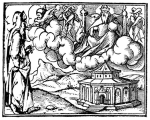 “For whoever keeps the whole Law but fails in one point has become accountable for all of it. For he who said, ‘Do not commit adultery,’ also said, ‘Do not murder.’ If you do not commit adultery but do murder, you have become a transgressor of the Law.” – James 2:10-11
“For whoever keeps the whole Law but fails in one point has become accountable for all of it. For he who said, ‘Do not commit adultery,’ also said, ‘Do not murder.’ If you do not commit adultery but do murder, you have become a transgressor of the Law.” – James 2:10-11
Our culture is strongly opposed to any idea of eternal judgment, wrath, torment, and separation from God because of wrong deeds we have done. Most people would say, “Sure I’ve done wrong things. But I’m no Hitler. I’ve raised my family well, I’ve provided for them, I’ve helped the homeless, helped orphans even; I’ve given to charities, I’ve given to church. Sure I’ve done wrong things in my life, haven’t we all? But surely those good things in my life will outweigh the bad, right? Surely the Lord or Saint Peter or whoever will let me through the pearly gates because I’m basically a good person.”
When weighing our worthiness to enter the Kingdom of Heaven, it is natural for all of us to instantly begin comparing and sizing ourselves up to others around us or in history. We then deceive ourselves into thinking that since we personally don’t see anything possibly worthy of eternal condemnation and punishment, then it must not be so in reality, objectively, outside of us. Yet, when weighing our worthiness or unworthiness, the Scriptures say nothing of the comparison of ourselves to others, but rather it compares us in relation to God and Him alone. Do you want to truly weigh your holiness (or lack thereof)? Then weigh it against the infinite holiness and majesty of God. Here is the place where you will see how far you fall short.
Now the unfortunate thing is that we have no ability naturally of ourselves to see the holiness and righteousness of God with which to compare ourselves to begin with, because we are spiritually blind and in fact we are, “dead in trespasses and sins” (Ephesians 2:1). But that is why the Lord gave us the Scriptures, so that He can sovereignly reveal Himself, by His Spirit alone. We must wait on Him and His illumination though.
But, by the grace of God, He has given us Scriptures that show us our lost condition and we have this verse in James that comes along and says, “For whoever keeps the whole Law but fails in one point has become accountable for all of it.” How in the world is seeing our lost condition good news you say? Let’s continue, we’ll get to that.
Let’s just say for arguments’ sake you keep the Ten Commandments, except that you break one. According to this verse in James, you are now accountable for the whole thing, for you have become a transgressor of the Law. One sin, one falling short of the Law of God, and you are done for. And being “done for” means the Lord punishes you for eternity, because the One offended is infinitely and eternally holy.
But why is this so with the Law? Why is it breaking one Law constitutes breaking the entire thing? James explains why when he says, “For [God] who said, ‘Do not commit adultery,’ also said, ‘Do not murder.’ If you do not commit adultery but do murder, you have become a transgressor of the Law.” Whereas we want to cut each commandment up into little pieces (originally given to us in that way so the Lord could give us specifics and no wiggle room), to the Lord, the entire Law, the summing up of God’s revealed decrees, is a whole unit. It isn’t segmented, it is one organic piece, like a window. If you break one part of the window, the window is broken. So it is with the Law of God.
Then, Jesus came along and summed up the whole Law when He said, “Love the Lord your God with all your heart and with all your soul and with all your mind and with all your strength” (Mark 12:30) If we can say with Jesus that this is the summing up of the whole Law (Ten Commandments and otherwise), then it is right to say that breaking any one of the commandments of God is ultimately failing to, “Love the Lord your God with all your heart and with all your soul and with all your mind and with all your strength.” So if you commit murder, you have failed to, “Love the Lord your God with all your heart and with all your soul and with all your mind and with all your strength,” and you are thus subject to the judgment of God for all eternity. If you commit adultery, the same stands. And so it is with all the commands of God.
Here’s where the news just gets worse for humanity, though. All of us can attest that we probably have not broken just one single commandment. If we can say that, we’re probably deceiving ourselves. But how many of us would say we’ve broken all Ten Commandments?
Many deceitful teachers of all kinds love to preach from the Sermon on the Mount. “Ah,” they say, “I just love those passages because the instructions are just so simple. I teach these things to myself daily … along with Buddha’s wise teachings. Don’t steal, don’t kill, don’t give false testimony … yes, what great passages of teaching us to do what is right.” Really? It is obvious to me when someone says they love the Sermon on the Mount in the way stated above that they have absolutely no idea what Jesus is actually saying in it. It is a hard sermon.
Let me quote you just one passage: “You have heard that it was said to those of old, ‘You shall not murder; and whoever murders will be liable to judgment.’ But I say to you that everyone who is angry with his brother will be liable to judgment; whoever insults his brother will be liable to the council; and whoever says, ‘You fool!’ will be liable to the hell of fire” (Matthew 5:21-22).
Here’s my question: just going on the text above as the definitive rule of whether or not you will go to hell based upon just one day’s worth of deeds, how many of us have broken this Law? How many of us have been unjustly angry at someone? All of us, in some form or fashion have committed this and do so daily. I myself do this all the time and am desperately wicked as a result.
So is Jesus merely giving instruction on how to live? Or is He doing something else? Could it be Jesus is showing that performing external deeds and adhering to the Law in that manner totally neglects our hearts’ disposition in obeying it in the first place? If you have been angry with anyone, ever, Jesus is calling you a murderer and you are thus liable to judgment. Let that sink in. I am a murderer. And that is just one Law that Jesus refines. Theft? Adultery? Go through and read what Jesus is saying. It is quite radical and shines a spotlight upon our ruined natures. We are desperately wicked.
All of this shows that the Sermon on the Mount was not meant to just give us more instruction to follow, because based on Jesus’ principle, it is absolutely impossible for fallen man to adhere to the Law in order that he can be saved. The Sermon on the Mount raised the bar of the Law to a level that shows us we are lost, ruined and unable to do that which God commands.
Where is there hope in all of this? What a bleak picture for humanity! And with the current cultural climate so obsessed with positive thinking therapy/salvation, it is no wonder no one wants to hear these things. The truth is very difficult to believe, which is exactly why we need the Spirit’s working in us to show us its truth and validity.
Praise God He sent Jesus to do that which we could never do, so that by trusting in Him alone, we gain all that He merited in His morally perfect life. Jesus says in the Sermon on the Mount, right before he starts going through the refining of the Law of God, “Do not think that I have come to abolish the Law or the Prophets; I have not come to abolish them but to fulfill them. For truly, I say to you, until heaven and earth pass away, not an iota, not a dot, will pass from the Law until all is accomplished” (Matthew 5:17-18). Until what is accomplished? The fulfilling of the Law of God by Christ Himself.
Jesus is the fulfillment of the Law of God because He is the last Adam, the perfect Savior who accomplished all that we infinitely couldn’t. Whereas Adam, as humanities representative, failed in the task given to him by God, Jesus as the last Adam succeeded as the representative of all those who trust in Him alone (and not their works!) to bear their deserved wrath on the cross and credit to them all the rights and privileges earned during His earthly life.
God’s Law stands and we are required to uphold it for the glory of God, but also for own eternal futures’ sake. However, as shown above, we are incapable of upholding it ourselves and are thus thoroughly lost. Therefore Christ came and did for us what we couldn’t do for ourselves, that by trusting in Him and His work, you will be saved from the coming day of judgment upon all people for all time.
The message of the Law is not one merely of giving us instruction on how to live. It is primarily about Christ and His bearing the demands of the Law on behalf of His people. The Law is a mirror we hold up to expose how far we fall short of the glory of God, and yet at the same time it points to a great Law-bearer, who came and suffered wrath in our place for all the laws we have broken and then credits us with His perfect life and righteousness. There could be nothing better!

 After these things God tested Abraham and said to him, “Abraham!” And he said, “Here am I.” 2 He said, “Take your son, your only son Isaac, whom you love, and go to the land of Moriah, and offer him there as a burnt offering on one of the mountains of which I shall tell you.” 3 So Abraham rose early in the morning, saddled his donkey, and took two of his young men with him, and his son Isaac. And he cut the wood for the burnt offering and arose and went to the place of which God had told him. 4 On the third day Abraham lifted up his eyes and saw the place from afar. 5 Then Abraham said to his young men, “Stay here with the donkey; I and the boy will go over there and worship and come again to you.” 6 And Abraham took the wood of the burnt offering and laid it on Isaac his son. And he took in his hand the fire and the knife. So they went both of them together. 7 And Isaac said to his father Abraham, “My father!” And he said, “Here am I, my son.” He said, “Behold, the fire and the wood, but where is the lamb for a burnt offering?” 8 Abraham said, “God will provide for himself the lamb for a burnt offering, my son.” So they went both of them together.
After these things God tested Abraham and said to him, “Abraham!” And he said, “Here am I.” 2 He said, “Take your son, your only son Isaac, whom you love, and go to the land of Moriah, and offer him there as a burnt offering on one of the mountains of which I shall tell you.” 3 So Abraham rose early in the morning, saddled his donkey, and took two of his young men with him, and his son Isaac. And he cut the wood for the burnt offering and arose and went to the place of which God had told him. 4 On the third day Abraham lifted up his eyes and saw the place from afar. 5 Then Abraham said to his young men, “Stay here with the donkey; I and the boy will go over there and worship and come again to you.” 6 And Abraham took the wood of the burnt offering and laid it on Isaac his son. And he took in his hand the fire and the knife. So they went both of them together. 7 And Isaac said to his father Abraham, “My father!” And he said, “Here am I, my son.” He said, “Behold, the fire and the wood, but where is the lamb for a burnt offering?” 8 Abraham said, “God will provide for himself the lamb for a burnt offering, my son.” So they went both of them together. “For whoever keeps the whole Law but fails in one point has become accountable for all of it. For he who said, ‘Do not commit adultery,’ also said, ‘Do not murder.’ If you do not commit adultery but do murder, you have become a transgressor of the Law.” –
“For whoever keeps the whole Law but fails in one point has become accountable for all of it. For he who said, ‘Do not commit adultery,’ also said, ‘Do not murder.’ If you do not commit adultery but do murder, you have become a transgressor of the Law.” –  Tonight, I was reading through chapters three through five of Lamentations and Hebrews eight and I noticed a giant correlation between these chapters in both the Old and New Testaments. The lesson of Lamentations, or at least one lesson amongst many, is that God is serious about sin and its resultant judgment. If you test Him with your unrepentant sin, He will bring you to nothing, mercifully emptying you in hopes that you will see His faithfulness to keep you from pursuing that which injures the glory of God and thus you. Yet if you continue in it, He may be done mercifully intervening with trials that He means to move you toward repentance and faith and trust in Him and thus leave you to your sin. This is a frightening prospect and is in itself judgment.
Tonight, I was reading through chapters three through five of Lamentations and Hebrews eight and I noticed a giant correlation between these chapters in both the Old and New Testaments. The lesson of Lamentations, or at least one lesson amongst many, is that God is serious about sin and its resultant judgment. If you test Him with your unrepentant sin, He will bring you to nothing, mercifully emptying you in hopes that you will see His faithfulness to keep you from pursuing that which injures the glory of God and thus you. Yet if you continue in it, He may be done mercifully intervening with trials that He means to move you toward repentance and faith and trust in Him and thus leave you to your sin. This is a frightening prospect and is in itself judgment.
 “And as he came out of the temple, one of his disciples said to him, ‘Look, Teacher, what wonderful stones and what wonderful buildings!’ And Jesus said to him, ‘Do you see these great buildings? There will not be left here one stone upon another that will not be thrown down.'” –
“And as he came out of the temple, one of his disciples said to him, ‘Look, Teacher, what wonderful stones and what wonderful buildings!’ And Jesus said to him, ‘Do you see these great buildings? There will not be left here one stone upon another that will not be thrown down.'” – 
